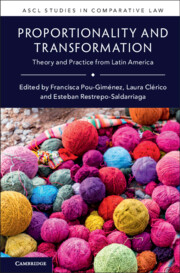Book contents
- Proportionality and Transformation
- Ascl Studies in Comparative Law
- Proportionality and Transformation
- Copyright page
- Contents
- Editors
- Contributors
- Acknowledgments
- Introduction
- Part I Proportionality and Processes of Constitutionalization
- Part II Proportionality in Social Rights and Equality-Based Adjudication
- Part III Proportionality, between Transformation and the Status Quo
- 10 Between Exception and Transition
- 11 Proportionality and State Ius Puniendi
- 12 Distributional Analysis as an Alternative to Proportionality Analysis in Judicial Decision-Making
- 13 Proportionality, Social Justice and Democracy
- 14 Unilateralism, Dialogue and False Necessity
- Epilogue
- Index
14 - Unilateralism, Dialogue and False Necessity
The Distribution of the Burden of Proof in Proportionality Analysis
from Part III - Proportionality, between Transformation and the Status Quo
Published online by Cambridge University Press: 27 October 2022
- Proportionality and Transformation
- Ascl Studies in Comparative Law
- Proportionality and Transformation
- Copyright page
- Contents
- Editors
- Contributors
- Acknowledgments
- Introduction
- Part I Proportionality and Processes of Constitutionalization
- Part II Proportionality in Social Rights and Equality-Based Adjudication
- Part III Proportionality, between Transformation and the Status Quo
- 10 Between Exception and Transition
- 11 Proportionality and State Ius Puniendi
- 12 Distributional Analysis as an Alternative to Proportionality Analysis in Judicial Decision-Making
- 13 Proportionality, Social Justice and Democracy
- 14 Unilateralism, Dialogue and False Necessity
- Epilogue
- Index
Summary
This chapter focuses on the distribution of the burdens of argumentation in proportionality analysis. A survey of rights adjudication in Latin America and other countries suggests that the idea of proportionality as an interchange of reasons and justifications has substantial conceptual and institutional indeterminacies, which may only be solved with a view on the normative consequences of the different options in different contexts. The chapter explores two extreme versions of the distribution – the dialogic and the unilateral – but also the gradation or continuum between them, with flexible and strict versions of dialogue and open and closed modalities of unilateralism. The selection of one or another point along the spectrum has consequences in terms of normative rationales such as democracy, epistemic quality, integrity, equality or legal security, and should carefully account for contextual elements like patterns of access to justice, legal culture and procedural architectures.
Keywords
- Type
- Chapter
- Information
- Proportionality and TransformationTheory and Practice from Latin America, pp. 289 - 308Publisher: Cambridge University PressPrint publication year: 2022

